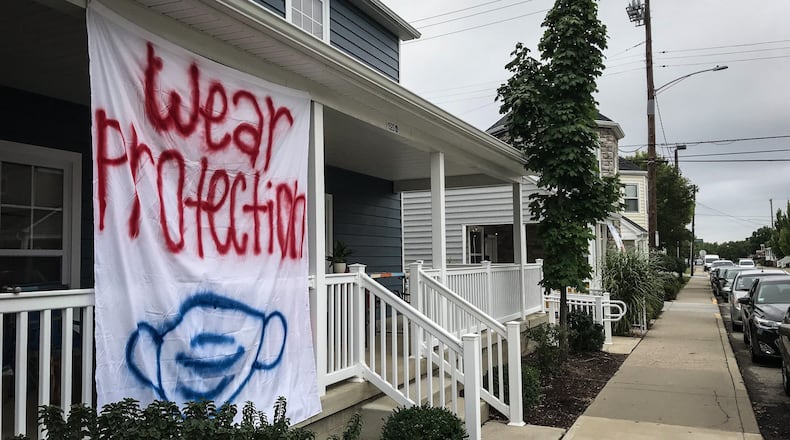Students return to area colleges this month for the start of the fall semester.
Anyone at Sinclair College will be required to wear masks and follow social distancing while inside the college’s buildings starting today, the college said. University of Dayton students and staff must are also required to masks inside, including in dining halls, unless they are actively eating or drinking. Masks will have to be worn inside all Wittenberg University indoor environments starting Thursday, the university said.
Wright State University also will require anyone indoors to wear a mask on campus regardless of vaccination status beginning Thursday, said WSU President Sue Edwards.
Cedarvillle University announced on Thursday they do not plan to require masks or social distancing on campus at this time.
Ohio State University announced Monday that everyone on campus is required to wear masks inside buildings. At Ohio State, unvaccinated people also are required to wear masks while outside, according to their updated masking policy.
“The policy was instituted in response to the increased prevalence of the Delta variant and updated guidance from the CDC,” said Ben Johnson, a spokesman for Ohio State.
The university noted the delta variant is especially dangerous and spreading rapidly in Ohio and across the U.S.
“The delta variant is much more contagious than previous versions of the virus, causes infected patients to have substantially higher amounts of the virus in their system, and can be transmitted to others even by fully vaccinated people who contract the virus,” Ohio State said in a release.
Wright State said it would require those living on campus to be tested, according to a universitywide email from Edwards dated July 29. Testing will be available for students, faculty and staff who demonstrate COVID-19 symptoms or asymptomatic employees and students with known or suspected exposure to COVID-19, regardless of vaccination status, the university said.
“We have heard from our students and our employees that there is simply no substitute for being together, whether through on-campus instruction or other campus activities,” Edwards said. “The return to campus will follow the safety precautions as recommended by state and federal public health officials.”
Most colleges and universities in the region have said they are strongly recommending vaccines. Public colleges and universities are not able to mandate students get vaccines, due to a recent Ohio law passed that forbids them from doing so.
The law takes effect in October and does not apply to private higher educational institutions or to hospitals associated with any university or college.
Cleveland State University, a public school in northeast Ohio, is requiring students living in residence halls to be vaccinated, said university spokeswoman Alison Bibb-Carson. Medical and religious exemptions are available for qualifying individuals.
Several schools throughout the region said they plan to host vaccine clinics during the fall. UD, Wright State, Ohio State, Wilberforce University and Miami plan on having distribution events on campus.
Miami University also will offer vaccination opportunities to students during the move-in process for the upcoming semester. Wittenberg University has plans for two Pfizer clinics during the upcoming semester.

